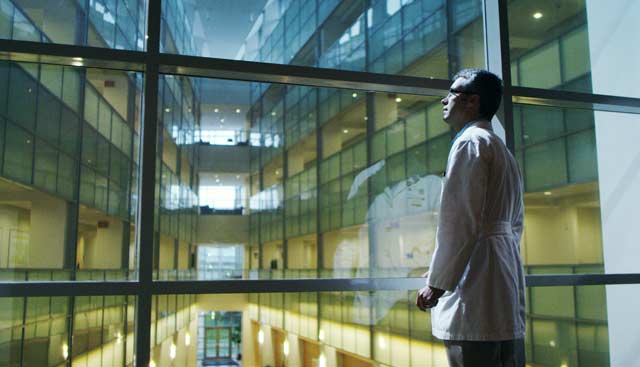Sarcoma Causes and Risk Factors
Sarcoma is a broad category of relatively uncommon cancers that can originate in connective tissues throughout the body. There are two main types: tumors that form in bones, such as osteosarcoma and Ewing’s sarcoma, and tumors that form in muscles, fat, nerves and other soft tissues, such as leiomyosarcoma and liposarcoma.
 What causes sarcoma?
What causes sarcoma?
Through extensive research, scientists have confirmed that many cancers, including sarcoma, result from DNA mutations that are either passed from parent to child or acquired during life. These DNA mutations can cause cancer by interfering with the function of:
- Oncogenes, which promote orderly cellular division
- Tumor suppressor genes, which cause cells to die at the end of their normal lifespan
If the genes that regulate cell division and death do not function properly, excess cells can build up, bind together, form tumors and potentially spread to nearby lymph nodes and other tissues.
Do sarcoma causes vary by subtype?
Sarcoma has more than 70 distinct subtypes, and its causes can vary by subtype. For example, in a recent study, scientists found that a mutation in the MYOD1 gene may cause immature muscle cells to divide uncontrollably rather than mature into healthy muscle cells. However, this gene mutation was found in tissue samples from only one subtype of sarcoma: embryonal rhabdomyosarcoma.
Is sarcoma hereditary?
Researchers have identified several inherited cancer predisposition syndromes that may increase the risk of certain types of sarcoma. These genetic disorders, which can be passed down from parent to child, include:
- Li-Fraumeni syndrome
- Neurofibromatosis type 1
- Retinoblastoma
- Hereditary leiomyomatosis and renal cell cancer
- Gardner syndrome
- Werner syndrome
- Multiple osteochondromas
While these genetic cancer predisposition syndromes can increase the likelihood of developing sarcoma, it is important to note that most sarcomas occur sporadically with no clear hereditary component. Genetic counseling and testing can help identify individuals at heightened risk for sarcoma due to hereditary factors, enabling proactive surveillance and early intervention when necessary.
Additionally, researchers have determined that the genetic changes that lead to certain types of sarcoma, such as Ewing’s sarcoma, are not hereditary.
Contact us today to schedule an appointment. Call us at 1-888-663-3488 or request an appointment online.
What causes sarcoma in adults?
For most types of cancer, advanced age is the single biggest risk factor. In general, the risk increases significantly after age 50, and approximately 50% of all cancers are diagnosed after age 65. Sarcoma, however, is an exception. While relatively uncommon among people of all ages, sarcoma is exceedingly rare in adults, accounting for less than 1% of adult cancers (compared to 15% of childhood cancers). The reasons are unknown.
What are the risk factors for sarcoma?
Through extensive research, scientists have linked certain characteristics, behaviors and exposures to an increased risk of sarcoma. While some risk factors for sarcoma are uncontrollable, others can be proactively managed.
Sarcoma risk factors that cannot be changed
In addition to certain genetic cancer predisposition syndromes, other sarcoma risk factors that cannot be controlled include:
- Age – Some types of sarcoma, such as osteosarcoma and Ewing’s sarcoma, often occur in children and young adults during periods of rapid growth and development.
- Gender – Leiomyosarcoma is more common in females, while rhabdomyosarcoma has a higher incidence in males.
- Chronic lymphedema – Long-term swelling in the arms or legs has been linked to angiosarcoma, a rare and aggressive type of cancer that originates in blood vessels (endothelial cells) or lymphatic vessels.
- Radiation exposure – Ionizing radiation from prior cancer treatment is a known risk factor for sarcoma.
Sarcoma risk factors that can be changed
Some controllable risk factors for sarcoma include:
- Chemical exposure – Minimizing exposure to certain industrial chemicals and toxins, such as vinyl chloride and arsenic, can reduce the risk of sarcoma.
- Radiation exposure – While prior radiation therapy for medical treatment is a nonmodifiable risk factor, it may be possible to minimize exposure to natural sources of ionizing radiation found in some soil, water and vegetation.
In occupational settings in certain high-risk industries, such as mining and defense, it is essential to follow all recommended safety guidelines and use appropriate personal protective equipment (PPE). Although these measures can help reduce the risk of sarcoma, they cannot completely prevent it. Individuals who are concerned about their risk profile should see a physician for personalized guidance.
Benefit from world-class care at Moffitt Cancer Center
As the only National Cancer Institute-designated Comprehensive Cancer Center based in Florida, Moffitt receives extensive support to perform cancer studies and clinical trials, and our outstanding research team continues to learn more about sarcoma causes and risk factors every day. We take a unique bench-to-bedside approach to ensure that our patients can benefit from our research breakthroughs as soon as possible. Whenever we discover a potential risk factor, new diagnostic technique or promising treatment option, we quickly implement our newfound knowledge to expand our services and offerings.
If you would like to learn more about sarcoma causes and risk factors, you can request an appointment with a specialist in our Sarcoma Program by calling 1-888-663-3488 or submitting a new patient registration form online. We do not require referrals.
References
American Cancer Society – What Causes Soft Tissue Sarcomas?
Ewing Sarcoma - Childhood and Adolescence: Risk Factors
American Society of Clinical Oncology – Sarcomas, Soft Tissue: Risk Factors
National Institutes of Health – Sarcomas Associated With Genetic Cancer Predisposition Syndromes: A Review
Diagnosis & Treatment
